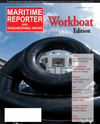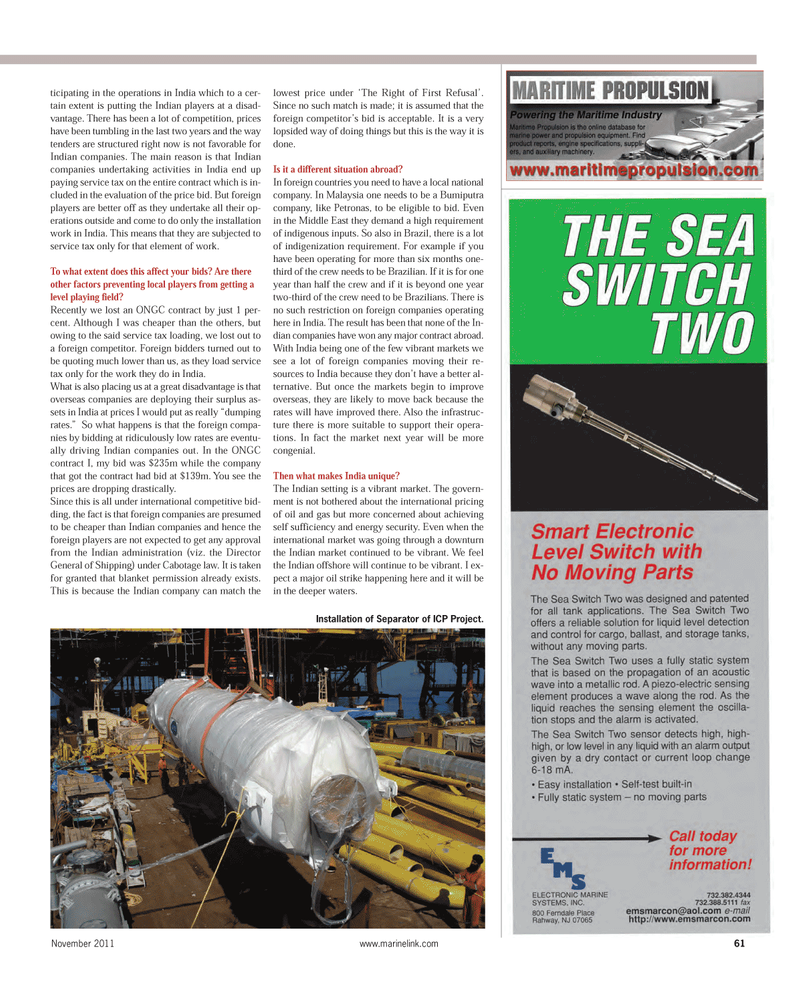
Page 61: of Maritime Reporter Magazine (November 2011)
Feature: Workboat Annual
Read this page in Pdf, Flash or Html5 edition of November 2011 Maritime Reporter Magazine
ticipating in the operations in India which to a cer- tain extent is putting the Indian players at a disad- vantage. There has been a lot of competition, prices have been tumbling in the last two years and the way tenders are structured right now is not favorable for Indian companies. The main reason is that Indian companies undertaking activities in India end up paying service tax on the entire contract which is in-cluded in the evaluation of the price bid. But foreign players are better off as they undertake all their op- erations outside and come to do only the installationwork in India. This means that they are subjected to service tax only for that element of work. To what extent does this affect your bids? Are there other factors preventing local players from getting a level playing field? Recently we lost an ONGC contract by just 1 per- cent. Although I was cheaper than the others, but owing to the said service tax loading, we lost out to a foreign competitor. Foreign bidders turned out to be quoting much lower than us, as they load service tax only for the work they do in India. What is also placing us at a great disadvantage is that overseas companies are deploying their surplus as- sets in India at prices I would put as really ?dumping rates.? So what happens is that the foreign compa- nies by bidding at ridiculously low rates are eventu- ally driving Indian companies out. In the ONGC contract I, my bid was $235m while the company that got the contract had bid at $139m. You see the prices are dropping drastically. Since this is all under international competitive bid- ding, the fact is that foreign companies are presumed to be cheaper than Indian companies and hence theforeign players are not expected to get any approval from the Indian administration (viz. the DirectorGeneral of Shipping) under Cabotage law. It is taken for granted that blanket permission already exists. This is because the Indian company can match the lowest price under ?The Right of First Refusal?. Since no such match is made; it is assumed that theforeign competitor?s bid is acceptable. It is a very lopsided way of doing things but this is the way it is done.Is it a different situation abroad? In foreign countries you need to have a local national company. In Malaysia one needs to be a Bumiputra company, like Petronas, to be eligible to bid. Even in the Middle East they demand a high requirement of indigenous inputs. So also in Brazil, there is a lotof indigenization requirement. For example if you have been operating for more than six months one- third of the crew needs to be Brazilian. If it is for one year than half the crew and if it is beyond one year two-third of the crew need to be Brazilians. There is no such restriction on foreign companies operatinghere in India. The result has been that none of the In- dian companies have won any major contract abroad. With India being one of the few vibrant markets we see a lot of foreign companies moving their re- sources to India because they don?t have a better al- ternative. But once the markets begin to improve overseas, they are likely to move back because the rates will have improved there. Also the infrastruc- ture there is more suitable to support their opera- tions. In fact the market next year will be more congenial. Then what makes India unique? The Indian setting is a vibrant market. The govern- ment is not bothered about the international pricingof oil and gas but more concerned about achieving self sufficiency and energy security. Even when the international market was going through a downturn the Indian market continued to be vibrant. We feel the Indian offshore will continue to be vibrant. I ex- pect a major oil strike happening here and it will be in the deeper waters. November 2011www.marinelink.com 61Installation of Separator of ICP Project. MR Nov.11 # 8 (57-64):MR Template 11/2/2011 1:46 PM Page 61

 60
60

 62
62
